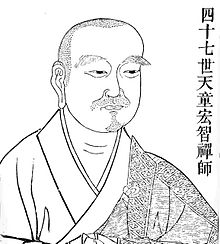
Back Hongzhi Zhengjue German Hongzhi Zhengjue French 宏智正覚 Japanese 굉지정각 Korean Hongzhi Zhengjue Polish Hoằng Trí Chính Giác Vietnamese 宏智正覺 Chinese
 | |
| Title | Chan master |
| Personal life | |
| Born | 1091 Xizhou (now in Shanxi Province), China |
| Died | 1157 |
| Religious life | |
| Religion | Buddhism |
| School | Chan |
| Senior posting | |
| Teacher | Danxia Zichun |
| Predecessor | Danxia Zichun |
| Part of a series on |
| Zen Buddhism |
|---|
 |
Hongzhi Zhengjue (Chinese: 宏智正覺; pinyin: Hóngzhì Zhēngjué; Wade–Giles: Hung-chih Cheng-chueh, Japanese: Wanshi Shōgaku), also sometimes called Tiantong Zhengjue (Chinese: 天童正覺; pinyin: Tiāntóng Zhēngjué; Japanese: Tendō Shōgaku) (1091–1157),[1][2] was an influential Chinese Chan Buddhist monk who authored or compiled several influential texts. Hongzhi's conception of silent illumination is of particular importance to the Chinese Caodong Chan and Japanese Sōtō Zen schools.[1] Hongzhi was also the author of the Book of Equanimity, an important collection of kōans.